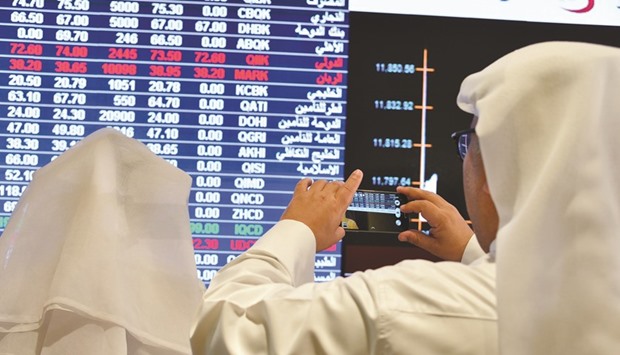A cautious optimism dots Qatar's capital market in view of the rising geopolitical uncertainty, even as investors expect the ongoing Middle East skirmishes to be largely contained.
"Any uncertainty (of this magnitude) is bad for the market as it dents investors' confidence," an analyst with a leading asset management firm said.
The sources said market has already discounted apprehensions over a protracted uncertainty in the region owing to economic and political costs for the countries involved.
"The present volatility in the region had led to a knee jerk reaction," an analyst with a brokerage house of a leading bank said, adding Qatar's strong buffers would to a large extend bulwark the short-to-medium uncertainty.
"Given the current situation, investors would rather adopt risk-averse strategy," he said, adding certain sectors that have direct bearing could witness some more corrections.
Already global credit rating agency Fitch has said the potential for a broader escalation of conflict in the Middle East has increased, but remains contained.
Referring to the statement of US Wednesday that it does not want to use more force; it will subdue the apprehensions for now, and the markets in the region would take a clue from this when it opens on Thursday, the analyst said.
Although there was an initial panic in the Qatari stock market, it was largely subdued in the subsequent sessions as there was institutional buying support, indicating their confidence in the country's economy.
The expansionary budget is seen as one of the strong points that has lent support the positive sentiments among investors in the market.
Qatar had presented an expansionary 2020 general budget with a five-year high expenditure, yet making a modest surplus, reflecting unhindered development projects across sectors as new housing for nationals, food security and those in the free and special economic zones.
Total revenue is forecast at QR211bn, unchanged from the 2019 budget; whereas expenditure is slated to see almost 2% year-on-year jump to QR210.5bn, leaving a budget surplus of QR500mn, amidst a continued conservative oil price estimate of $55 a barrel.
The significant outlay for infrastructure, health and education sectors would mean the sustenance of country's core policies, which ought to be well received by the corporate sector too, he said.
The sources said market has already discounted apprehensions over a protracted uncertainty in the region owing to economic and political costs for the countries involved.
"The present volatility in the region had led to a knee jerk reaction," an analyst with a brokerage house of a leading bank said, adding Qatar's strong buffers would to a large extend bulwark the short-to-medium uncertainty.
"Given the current situation, investors would rather adopt risk-averse strategy," he said, adding certain sectors that have direct bearing could witness some more corrections.
Already global credit rating agency Fitch has said the potential for a broader escalation of conflict in the Middle East has increased, but remains contained.
Referring to the statement of US Wednesday that it does not want to use more force; it will subdue the apprehensions for now, and the markets in the region would take a clue from this when it opens on Thursday, the analyst said.
Although there was an initial panic in the Qatari stock market, it was largely subdued in the subsequent sessions as there was institutional buying support, indicating their confidence in the country's economy.
The expansionary budget is seen as one of the strong points that has lent support the positive sentiments among investors in the market.
Qatar had presented an expansionary 2020 general budget with a five-year high expenditure, yet making a modest surplus, reflecting unhindered development projects across sectors as new housing for nationals, food security and those in the free and special economic zones.
Total revenue is forecast at QR211bn, unchanged from the 2019 budget; whereas expenditure is slated to see almost 2% year-on-year jump to QR210.5bn, leaving a budget surplus of QR500mn, amidst a continued conservative oil price estimate of $55 a barrel.
The significant outlay for infrastructure, health and education sectors would mean the sustenance of country's core policies, which ought to be well received by the corporate sector too, he said.


